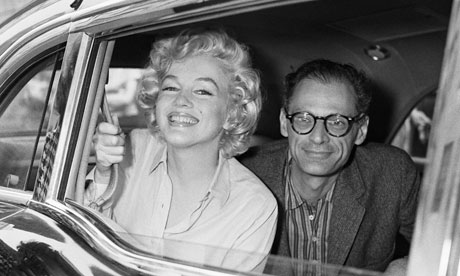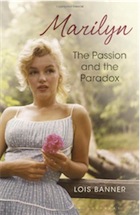
Marilyn Monroe and Arthur Miller. Photograph: Bettmann/Corbis
In one of the most famous photos of the 20th century, Marilyn Monroe stands on a subway grate, trying to hold her skirt down as a gust of wind blows it up, exposing her underpants. The photo was taken in New York on 15 September, 1954, in a photoshoot during the filming of The Seven Year Itch
 Marilyn is a vision in white, suggesting innocence and purity. Yet she exudes sexuality and transcends it; poses for the male gaze and confronts it. The photoshoot was a publicity stunt, one of the greatest in the history of film. Its time and location were published in New York newspapers; it attracted a crowd of 100 male photographers and 1,500 male spectators, even though it was held in the middle of the night to avoid daytime crowds. Sam Shaw, the stills photographer for the m ovie, took the famous photo, but the other photographers there shot hundreds of variations.
Marilyn is a vision in white, suggesting innocence and purity. Yet she exudes sexuality and transcends it; poses for the male gaze and confronts it. The photoshoot was a publicity stunt, one of the greatest in the history of film. Its time and location were published in New York newspapers; it attracted a crowd of 100 male photographers and 1,500 male spectators, even though it was held in the middle of the night to avoid daytime crowds. Sam Shaw, the stills photographer for the m ovie, took the famous photo, but the other photographers there shot hundreds of variations.
Billy Wilder, the film's director, did 14 takes – pausing between them to let the photographers shoot. Every time Marilyn's skirt blew up, the crowd roared, especially those up front, who could see a dark blotch of pubic hair through her underpants, even though she had put on two pairs to conceal it. The draconian 1934 Motion Picture Production Code forbade such a display. Any sign of pubic hair in photos had to be airbrushed out.
The scene in the shoot is naughty, with the phallic subway train, its blast of air, and Marilyn's erotic stance. Yet she is in control. She is the "woman on top," drawing from the metaphor for women's power that runs through Euro-American history. She poses for the male gaze, but she is an unruly woman – the white witch with supernatural powers; the burlesque star in "an upside-down world of enormous, powerful women and powerless, victimised men". In the photo Marilyn is so gorgeous, so glamorous, so incandescent – as her third husband, the writer Arthur Miller, described her – that she seems every inch a star, glorying in her success. She can now defy the people who had mistreated her: her father and mother, who abandoned her; foster parents who abused her; Hollywood patriarchs who regarded her as their toy; even Joe DiMaggio, then her husband, who physically abused her. Present at the shoot, he stalked off in a fury when her skirt billowed up and revealed her underwear.
In her only discussion of the shoot – a 1962 interview – she stated that she wasn't thinking about sex when she posed, only about having a good time. "At first it was all innocent and fun," Marilyn said, "but when Billy kept shooting the scene over and over the crowd of men kept on applauding and shouting, 'More, more Marilyn – let's see more." Then Billy brought the camera in close, focusing on her crotch. "What was supposed to be a fun scene turned into a sex scene." With her wry humour, Marilyn added: "I hope all those extra takes are not for your Hollywood friends to enjoy at a private party."
 Marilyn is a vision in white, suggesting innocence and purity. Yet she exudes sexuality and transcends it; poses for the male gaze and confronts it. The photoshoot was a publicity stunt, one of the greatest in the history of film. Its time and location were published in New York newspapers; it attracted a crowd of 100 male photographers and 1,500 male spectators, even though it was held in the middle of the night to avoid daytime crowds. Sam Shaw, the stills photographer for the m ovie, took the famous photo, but the other photographers there shot hundreds of variations.
Marilyn is a vision in white, suggesting innocence and purity. Yet she exudes sexuality and transcends it; poses for the male gaze and confronts it. The photoshoot was a publicity stunt, one of the greatest in the history of film. Its time and location were published in New York newspapers; it attracted a crowd of 100 male photographers and 1,500 male spectators, even though it was held in the middle of the night to avoid daytime crowds. Sam Shaw, the stills photographer for the m ovie, took the famous photo, but the other photographers there shot hundreds of variations.Billy Wilder, the film's director, did 14 takes – pausing between them to let the photographers shoot. Every time Marilyn's skirt blew up, the crowd roared, especially those up front, who could see a dark blotch of pubic hair through her underpants, even though she had put on two pairs to conceal it. The draconian 1934 Motion Picture Production Code forbade such a display. Any sign of pubic hair in photos had to be airbrushed out.
The scene in the shoot is naughty, with the phallic subway train, its blast of air, and Marilyn's erotic stance. Yet she is in control. She is the "woman on top," drawing from the metaphor for women's power that runs through Euro-American history. She poses for the male gaze, but she is an unruly woman – the white witch with supernatural powers; the burlesque star in "an upside-down world of enormous, powerful women and powerless, victimised men". In the photo Marilyn is so gorgeous, so glamorous, so incandescent – as her third husband, the writer Arthur Miller, described her – that she seems every inch a star, glorying in her success. She can now defy the people who had mistreated her: her father and mother, who abandoned her; foster parents who abused her; Hollywood patriarchs who regarded her as their toy; even Joe DiMaggio, then her husband, who physically abused her. Present at the shoot, he stalked off in a fury when her skirt billowed up and revealed her underwear.
In her only discussion of the shoot – a 1962 interview – she stated that she wasn't thinking about sex when she posed, only about having a good time. "At first it was all innocent and fun," Marilyn said, "but when Billy kept shooting the scene over and over the crowd of men kept on applauding and shouting, 'More, more Marilyn – let's see more." Then Billy brought the camera in close, focusing on her crotch. "What was supposed to be a fun scene turned into a sex scene." With her wry humour, Marilyn added: "I hope all those extra takes are not for your Hollywood friends to enjoy at a private party."
No comments:
Post a Comment